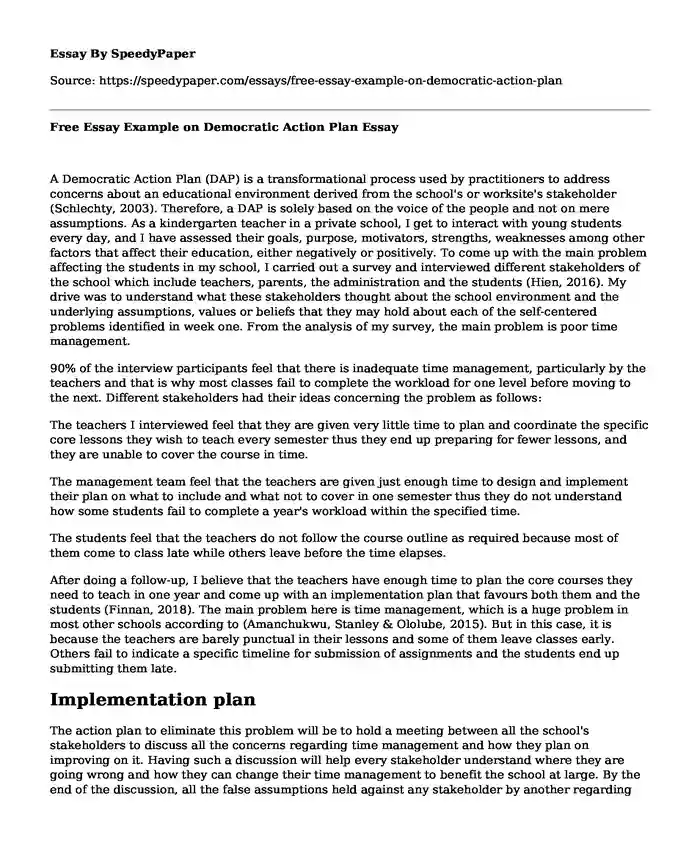A Democratic Action Plan (DAP) is a transformational process used by practitioners to address concerns about an educational environment derived from the school's or worksite's stakeholder (Schlechty, 2003). Therefore, a DAP is solely based on the voice of the people and not on mere assumptions. As a kindergarten teacher in a private school, I get to interact with young students every day, and I have assessed their goals, purpose, motivators, strengths, weaknesses among other factors that affect their education, either negatively or positively. To come up with the main problem affecting the students in my school, I carried out a survey and interviewed different stakeholders of the school which include teachers, parents, the administration and the students (Hien, 2016). My drive was to understand what these stakeholders thought about the school environment and the underlying assumptions, values or beliefs that they may hold about each of the self-centered problems identified in week one. From the analysis of my survey, the main problem is poor time management.
90% of the interview participants feel that there is inadequate time management, particularly by the teachers and that is why most classes fail to complete the workload for one level before moving to the next. Different stakeholders had their ideas concerning the problem as follows:
The teachers I interviewed feel that they are given very little time to plan and coordinate the specific core lessons they wish to teach every semester thus they end up preparing for fewer lessons, and they are unable to cover the course in time.
The management team feel that the teachers are given just enough time to design and implement their plan on what to include and what not to cover in one semester thus they do not understand how some students fail to complete a year's workload within the specified time.
The students feel that the teachers do not follow the course outline as required because most of them come to class late while others leave before the time elapses.
After doing a follow-up, I believe that the teachers have enough time to plan the core courses they need to teach in one year and come up with an implementation plan that favours both them and the students (Finnan, 2018). The main problem here is time management, which is a huge problem in most other schools according to (Amanchukwu, Stanley & Ololube, 2015). But in this case, it is because the teachers are barely punctual in their lessons and some of them leave classes early. Others fail to indicate a specific timeline for submission of assignments and the students end up submitting them late.
Implementation plan
The action plan to eliminate this problem will be to hold a meeting between all the school's stakeholders to discuss all the concerns regarding time management and how they plan on improving on it. Having such a discussion will help every stakeholder understand where they are going wrong and how they can change their time management to benefit the school at large. By the end of the discussion, all the false assumptions held against any stakeholder by another regarding time management will be cleared. Also, the management team will lead the group to come up with the best time management policies to be followed by all the stakeholders to improve performance by the students and the school at large (Bacia & Ittel, 2017.
References
Amanchukwu, R. N., Stanley, G. J., & Ololube, N. P. (2015). A review of leadership theories, principles and styles and their relevance to educational management. Management, 5(1), 6-14.
Bacia, E., & Ittel, A. (2017). Education to Thrive in a Heterogeneous and Democratic Society-A Task for Citizenship and Character Education? Results of Case Studies in Three Berlin Schools. JSSE-Journal of Social Science Education, 16(3).
Bryk, A. (2018). Charting Chicago school reform: Democratic localism as a lever for change. Routledge.
Finnan, C. (2018). Accelerating the learning of all students: Cultivating culture change in schools, classrooms and individuals. Routledge.
Hien, T. T. T. (2016). Why is action research suitable for education?. VNU Journal of Science: Foreign Studies, 25(2).
Hill, C. W., Jones, G. R., & Schilling, M. A. (2014). Strategic management: theory: an integrated approach. Cengage Learning.
March, A. (2016). The democratic plan: Analysis and diagnosis. Routledge.
Schlechty, P. C. (2003). Inventing better schools: An action plan for educational reform. John Wiley & Sons.
Cite this page
Free Essay Example on Democratic Action Plan. (2022, Jul 13). Retrieved from https://speedypaper.net/essays/free-essay-example-on-democratic-action-plan
Request Removal
If you are the original author of this essay and no longer wish to have it published on the SpeedyPaper website, please click below to request its removal:
- Free Paper with Annotated Bibliography on Syria and Iraq Ethnic Conflict
- Essay Sample: Keeping Customers Happy in John Lewis Partnership
- Essay Example Dedicated to the Obstruction of Justice by Donald Trump
- An Open Letter to Gun Control Agencies - Argumentative Essay Example
- Essay Sample: American Republic under Jeffersonian and Jacksonian Democracy
- Paper Example: Globalization and Reform
- Essay Sample on Political Meaning - The Mule
Popular categories





